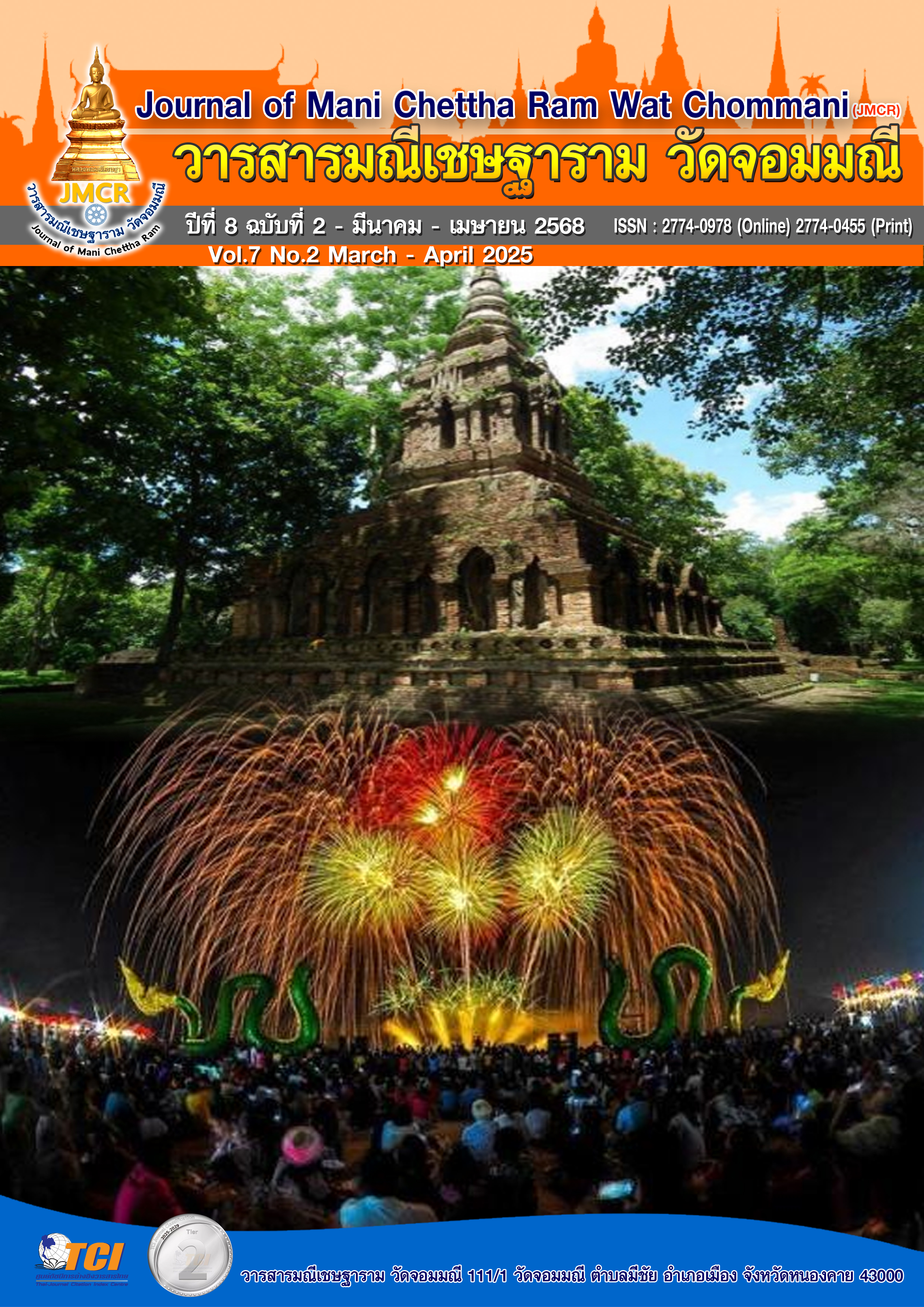SCHOOL AS LEARNING COMMUNITY DEVELOPMENT GUIDLINE OF THE EXTENSION SCHOOLS UNDER UDON THANI PRIMARY EDUCATIONAL SERVICE AREA OFFICE
Keywords:
Development Guidelines, School as Learning Community, The Extension SchoolAbstract
This research aimed (1) to study the current conditions, required conditions, and essential needs, and (2) to study guidelines for developing Schools as Learning Communities (SLC) in extension schools under the Udon Thani Primary Educational Service Area Office. The study was conducted in two phases using a mixed-method research approach. In Phase 1, the current conditions, required conditions, and essential needs were examined. The sample consisted of 264 participants, including school directors, teachers, school board members, and parents or community members. They were selected through multi-stage random sampling. The data were collected using a five-point Likert scale questionnaire. The analysis included percentage, mean, standard deviation, and reliability testing, yielding a reliability coefficient of 0.98. And Phase 2 aimed to develop guidelines. A panel of 12 expert stakeholders was selected using purposive sampling. Data were analyzed using the Multi-Attribute Consensus Reaching (MACR) method. The research results were found as follows;
1) The overall current conditions were at a moderate level, while the overall required conditions were at the highest level. The overall essential needs ranged from 0.663 to 0.711. 2) The guidelines for developing Schools as Learning Communities in extension schools under the Udon Thani Primary Educational Service Area Office are as follows: (1) Vision: Comprising learning together among students, a professional learning community for teachers, and cooperation in school reform. (2) Philosophy: Consisting of public philosophy, democratic philosophy, equality philosophy, and the philosophy of excellence. (3) Activities: Including collaborative learning, collegiality, and parental and community involvement.
References
กระทรวงศึกษาธิการ. (2555). พระราชบัญญัติการศึกษาแห่งชาติ พ.ศ.2542 และที่แก้ไขเพิ่มเติม (ฉบับที่ 2) พ.ศ.2545. สำนักงานเลขาธิการสภาการศึกษา.
ซาโต มานาบุ. (2559). การปฏิรูปโรงเรียน แนวความคิดชุมชนแห่งการเรียนรู้กับการนำทฤษฎีมาปฏิบัติจริง เล่มที่ 1. พิมพ์ครั้งที่ 2. กรุงเทพมหานคร: โรงพิมพ์ภาพพิมพ์.
บุญชม ศรีสะอาด. (2560). การวิจัยเบื้องต้น ฉบับปรับปรุงใหม่. (พิมพ์ครั้งที่ 10) . กรุงเทพมหานคร: สุวีริยาสาส์น.
ผดุงชัย ภู่พัฒน์. (2547). เอกสารประกอบการบรรยาย เรื่อง การประชุมอภิปรายแบบ MACR. คณะครุศาสตร์อุตสาหกรรม. กรุงเทพมหานคร: สถาบันเทคโนโลยีพระจอมเกล้าเจ้าคุณทหารลาดกระบัง.
มาซาอากิ ซาโตและเอสุเกะ ไซโต. (2560). เรียนรู้จากข้อเท็จจริงของเด็กและห้องเรียน การปฏิรูปโรงเรียนด้วยชุมชนแห่งการเรียนรู้และการไตร่ตรอง. (พิมพ์ครั้งที่ 1). กรุงเทพมหานคร: โรงพิมพ์ภาพพิมพ์.
สำนักงานเขตพื้นที่การศึกษาประถมศึกษาอุดรธานี เขต 1. (2567). แผนปฏิบัติการประจำปีงบประมาณ 2567. เรียกใช้เมื่อ 13 สิงหาคม 2567. https://udn1.go.th/archives/6965
สำนักงานเขตพื้นที่การศึกษาประถมศึกษาอุดรธานี เขต 2. (2567). แผนปฏิบัติการประจำปีงบประมาณ 2567. เรียกใช้เมื่อ 13 สิงหาคม 2567. https://shorturl.asia/oCJZ7
สำนักงานเขตพื้นที่การศึกษาประถมศึกษาอุดรธานี เขต 3. (2567). แผนปฏิบัติการประจำปีงบประมาณ 2567. เรียกใช้เมื่อ 13 สิงหาคม 2567. https://shorturl.asia/Y8biq
สำนักงานเขตพื้นที่การศึกษาประถมศึกษาอุดรธานี เขต 4. (2567). ระบบบริการข้อมูลกลางภาครัฐ Big DATA. เรียกใช้เมื่อ 13 สิงหาคม 2567. https://bigdata.udon4.go.th/.
อนงค์กาญจน์ ศรีจันทร์. (2563). แนวทางพัฒนาการบริหารโรงเรียนคุณภาพประจำตำบล ตามแนวคิดโรงเรียนเป็นชุมชนแห่งการเรียนรู้. ใน วิทยานิพนธ์ครุศาสตรมหาบัณฑิต สาขาวิชาการบริหารการศึกษา คณะครุศาสตร์. จุฬาลงกรณ์มหาวิทยาลัย.
Boyd, V. (1992). School Context: Bridge or Barrier for Change? Austin: Southwest Educational Development Lab.
Cronbach, L.J. (1951). Coefficient Alpha and the Internal Structure of Tests. Psychometrika, 16, 297 - 334.
Kruse, S. D., & Louis, K.S. (1993). An emerging framework for analyzing school-based professional community. Retrieved from: https://eric.ed.gov/?id=ED358537
Krejcie, R. V. & Morgan, D. W. (1970). Determining Sample Size for Research Activities. Educational and Psychological Measurement, 30(3): 607-610.
Schon, D. A. (1991). The reflective practitioner. Ashgate Publishing.
Sergiovanni, T. J. (1992). Moral Leadership: Getting to the Heart of School Improvement. San Francisco, CA: Jossey Bass.




